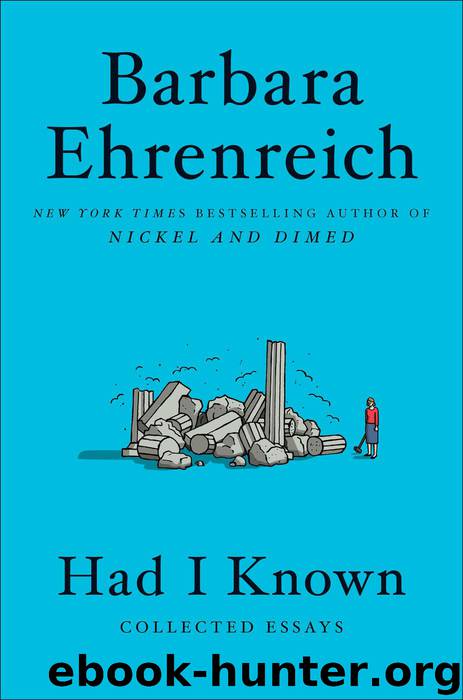Had I Known: Collected Essays by Barbara Ehrenreich

Author:Barbara Ehrenreich [Ehrenreich, Barbara]
Language: eng
Format: epub
ISBN: 9781455543670
Google: SQNXDQEACAAJ
Publisher: Grand Central Publishing
Published: 2020-03-24T00:00:00+00:00
The question for feminists is: Is this new man what we wanted? Just a few years ago, feminists were, on the whole, disposed to welcome any change in a direction away from traditional manhood. Betty Friedan, in The Second Stage, saw “the quiet movement of American men” as “a momentous change in their very identity as men, going beyond the change catalyzed by the women’s movement,” and she suggested that it might amount to a “massive, evolutionary development.”
That was written in a more innocent time, when feminists were debating the “Cinderella complex,” as Colette Dowling termed women’s atavistic dependencies on men, rather than the “Peter Pan syndrome,” which is how another best seller describes the male aversion to commitment. In recent months, there has been a small flurry of feminist attacks on the new male or on assorted new-male characteristics.
The Washington City Paper carried a much-discussed and thoroughly acid article on “Wormboys,” described by writer Deborah Laake as men who are “passive” in relation to women, who “shrink from marriage” and children, and “cannot be depended on during tough times.” According to one woman she quotes, these new men are so fearful of commitment that they even hesitate to ask a woman out to dinner: “They’re more interested in saying, ‘Why don’t you meet me for a drink?’ because it implies so much less commitment on their part.” I wouldn’t exaggerate the extent of the backlash, but it has been sufficient to send several male colleagues my way to ask, with nervous laughter, whether I was writing a new contribution to the “war on wimps.”
I don’t blame them for being nervous. My generation of feminists insisted that men change, but we were not always directive—or patient—enough to say how. We applauded every sign of male sensitivity or growth as if it were an evolutionary advance. We even welcomed the feminization of male tastes, expecting that the man who was a good cook and a tasteful decorator at twenty-five would be a devoted father and partner in midlife. We did not understand that men were changing along a trajectory of their own and that they might end up being less like what we are than like what we were once expected to be—vain and shallow and status-conscious.
But since these are times when any hint of revisionism easily becomes grist for conservatism, it is important to emphasize that if we don’t like the new male, neither are we inclined to return to the old one. If the new man tends to be a fop, the old man was (and is), at worst, a tyrant and a bully. At best, he was merely dull, which is why, during the peak years of male conformity, when the test of manhood lay in being a loyal breadwinner, so many of us lusted secretly for those few males—from James Dean and Elvis Presley to Jack Kerouac—who represented unattainable adventure. In our fantasies, as least, we did not want to enslave men, as Playboy’s writers liked to think, but to share the adventure.
Download
This site does not store any files on its server. We only index and link to content provided by other sites. Please contact the content providers to delete copyright contents if any and email us, we'll remove relevant links or contents immediately.
| Diaries & Journals | Essays |
| Letters | Speeches |
The Rules Do Not Apply by Ariel Levy(3945)
Bluets by Maggie Nelson(3753)
Too Much and Not the Mood by Durga Chew-Bose(3717)
Pre-Suasion: A Revolutionary Way to Influence and Persuade by Robert Cialdini(3453)
The Motorcycle Diaries by Ernesto Che Guevara(3371)
Walking by Henry David Thoreau(3258)
What If This Were Enough? by Heather Havrilesky(2958)
The Day I Stopped Drinking Milk by Sudha Murty(2887)
Schaum's Quick Guide to Writing Great Short Stories by Margaret Lucke(2826)
The Daily Stoic by Holiday Ryan & Hanselman Stephen(2731)
Why I Write by George Orwell(2385)
Letters From a Stoic by Seneca(2355)
The Social Psychology of Inequality by Unknown(2340)
A Short History of Nearly Everything by Bryson Bill(2156)
Feel Free by Zadie Smith(2128)
Insomniac City by Bill Hayes(2101)
A Burst of Light by Audre Lorde(1996)
Upstream by Mary Oliver(1965)
Miami by Joan Didion(1895)
